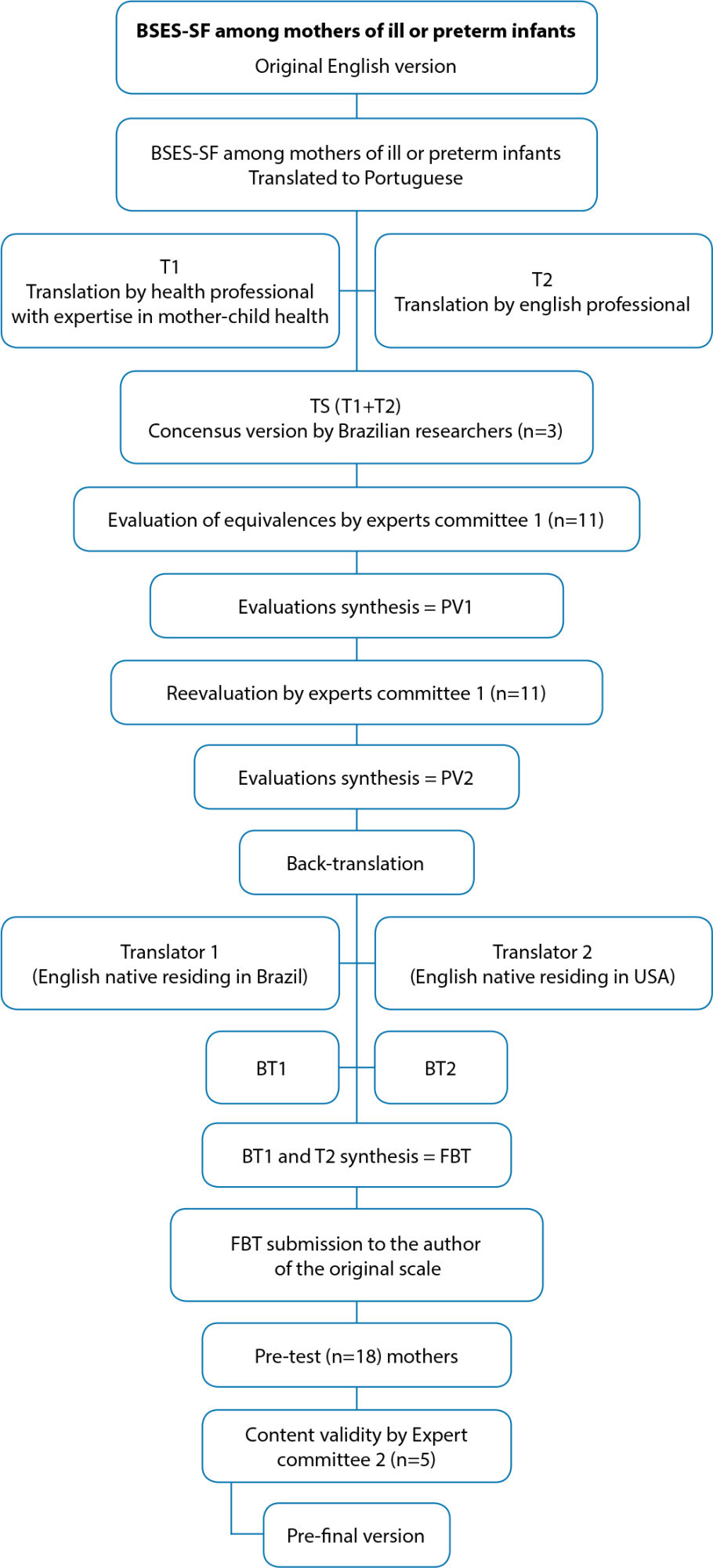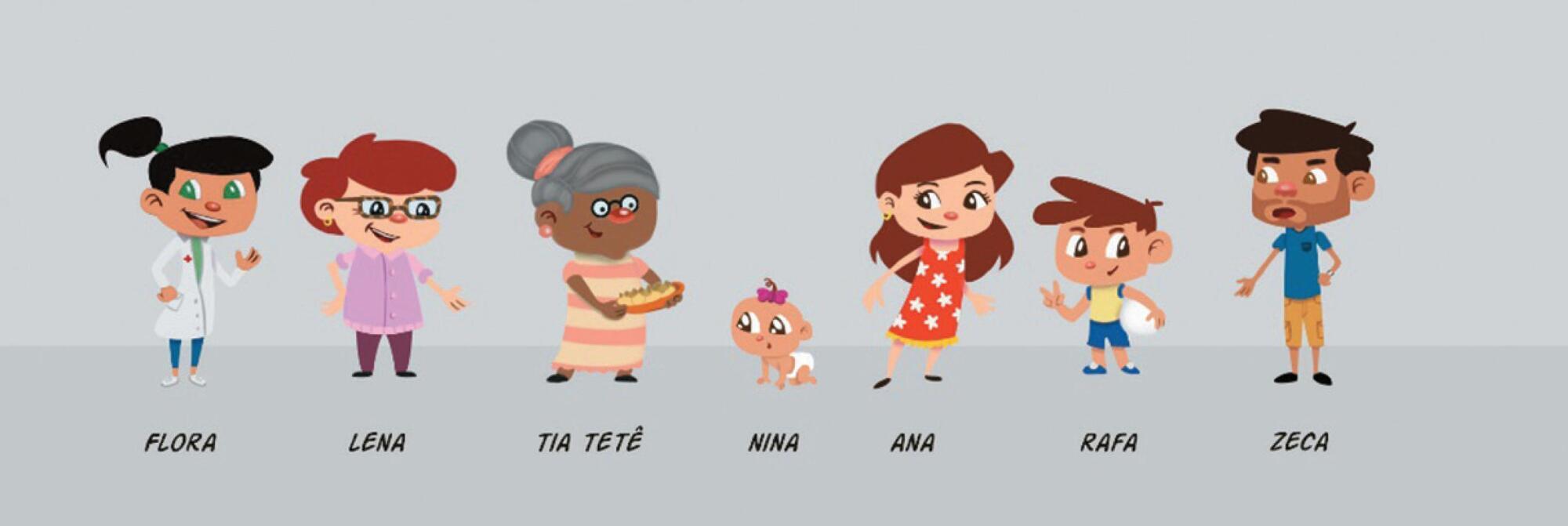-
ORIGINAL ARTICLE
Validation of telesimulation in the care of late preterm newborns with hypoglycemia for nursing students
Revista Brasileira de Enfermagem. 2023;76(Suppl 4):20220438
12-08-2023
Resumo
ORIGINAL ARTICLEValidation of telesimulation in the care of late preterm newborns with hypoglycemia for nursing students
Revista Brasileira de Enfermagem. 2023;76(Suppl 4):20220438
12-08-2023DOI 10.1590/0034-7167-2022-0438
Visualizações0Ver maisABSTRACT
Objective:
To develop and validate a telesimulation scenario for nursing students in the care of late preterm infants with hypoglycemia.
Methods:
A methodological study conducted between August 2021 and May 2022 in a virtual environment involved constructing and validating the scenario with 10 experts, and testing it with 10 students. The content validity index assessed validity, with a threshold of 80% or higher, and suggestions were analyzed using semantic approximation.
Results:
Validation confirmed the appropriateness of all 14 scenario items, with an overall index of 97.8% and clarity and relevance indices of 98.5%. During testing, the overall index was 99.7%, with the “resources” item receiving the lowest score. Adjustments were made to objectives, technical terms, resources, and target audience based on feedback.
Conclusion:
Telesimulation is a widely accepted educational technology for training nursing students, with potential to enhance teaching quality and neonatal care.
-
ORIGINAL ARTICLE
Cross-cultural adaptation of the Breastfeeding Self-Efficacy Scale Short Form (BSES-SF) modified for preterm mothers in Brazil
Revista Brasileira de Enfermagem. 2023;76(5):e20220497
11-27-2023
Resumo
ORIGINAL ARTICLECross-cultural adaptation of the Breastfeeding Self-Efficacy Scale Short Form (BSES-SF) modified for preterm mothers in Brazil
Revista Brasileira de Enfermagem. 2023;76(5):e20220497
11-27-2023DOI 10.1590/0034-7167-2022-0497
Visualizações0ABSTRACT
Objectives:
to conduct a cross-cultural adaptation of the Breastfeeding Self-Efficacy Scale-Short Form (BSES-SF) for mothers of ill and/or preterm infants among Portuguese-speaking mothers in Brazil.
Methods:
a methodological study was completed, including the translation of the tool, synthesis of translations, review by experts, synthesis, reassessment of experts, back-translation, pre-test, and validation of the content. The study involved 19 participants, including a translator and experts. In addition, 18 mothers from the target population were included in the pre-test.
Results:
the equivalences of the opinion obtained by the committee of experts were semantic (85%), idiom (89%), cultural (86%), and conceptual (94%). The content validation coefficient (CVC) on the scale was 0.93 for clarity and understanding; 0.89 for practical relevance; 0.92 for relevance; and the average overall CVC was 0.91.
Conclusions:
the scale was translated and adapted to the Brazilian Portuguese language, which maintained the equivalences and confirmed the content validity.
Palavras-chave: BreastfeedingMethodological Research in NursingPremature NewbornSelf-EfficacyValidation StudyVer mais
-
ORIGINAL ARTICLE
(Dis)continuation of care of the pre-term newborn at the border
Revista Brasileira de Enfermagem. 2020;73(3):e20180827
04-22-2020
Resumo
ORIGINAL ARTICLE(Dis)continuation of care of the pre-term newborn at the border
Revista Brasileira de Enfermagem. 2020;73(3):e20180827
04-22-2020DOI 10.1590/0034-7167-2018-0827
Visualizações0Ver maisABSTRACT
Objectives:
to understand how continuation of care for the preterm newborn in the health care network at the border.
Methods:
the Grounded Theory was the methodological framework. Data were collected through 17 semi-structured interviews between July 2016 and March 2017.
Results:
“Describing the structure and functioning of the Child Nutrition Center” represents the context; “Experiencing and signifying premature birth” are the causal conditions; “Identifying conditions that intervene in the process of continuation of care for the preterm newborn” are the intervening conditions; “Ensuring continuation of care for the preterm newborn” are strategies; “Identifying (dis)continuation of care flows for the preterm newborn at the border” are the study’s consequences and phenomenon.
Final Considerations:
there is a need to plan referral and counter-referral flows of the preterm newborn and the commitment of public health managers to ensure continuation of care.
-
ORIGINAL ARTICLE
Influence of oxygen in the development of retinopathy of prematurity
Revista Brasileira de Enfermagem. 2019;72(3):592-599
06-27-2019
Resumo
ORIGINAL ARTICLEInfluence of oxygen in the development of retinopathy of prematurity
Revista Brasileira de Enfermagem. 2019;72(3):592-599
06-27-2019DOI 10.1590/0034-7167-2018-0361
Visualizações0Ver maisABSTRACT
Objective:
to describe the influence of oxygen in retinopathy of prematurity (ROP) in premature newborns (PTNB) hospitalized in neonatal units of intensive care and undergoing ophthalmological follow-up procedures after hospital discharge.
Method:
retrospective cohort study, from January 2014 to June 2016, whose data collection totaled 181 charts. Descriptive and inferential statistical analysis.
Results:
when using oxygen (O2) in 148 PTNB (81.7%), both mask (n=141; 77.9%; p-value <0.001) and the tracheal tube predominated (n=100; 55.25; p-value <0.001) for 15 days in average. The time of use and O2 concentration of the tracheal tube (p-value <0.001), the time of mask use (p-value <0.001) and the time and concentration of O2 of the continuous positive airway pressure (CPAP) (p-value <0.001) were significant to cause ROP in 50 PTNB (11.31%).
Conclusion:
the oxygen therapy has influenced the development and severity of ROP, indicating the need to adopt protocols for its use.
-
RESEARCH
Educational animation about home care with premature newborn infants
Revista Brasileira de Enfermagem. 2018;71(suppl 4):1604-1610
01-01-2018
Resumo
RESEARCHEducational animation about home care with premature newborn infants
Revista Brasileira de Enfermagem. 2018;71(suppl 4):1604-1610
01-01-2018DOI 10.1590/0034-7167-2017-0401
Visualizações0Ver maisABSTRACT
Objective:
to elaborate and validate animation on the care of premature newborn infants at home.
Method:
Methodological study in three stages: integrative review on home care; animation design based on Roper, Logan and Tierney’s Model named “Activities of Living” (ALs), and validation of content and appearance by neonatology specialists. The steps to develop the animation were: creation of storyboard; definition of objects; specification of keyframes; and frame generation among key frameworks.
Results:
Of the 53 articles selected in the review, care was extracted and grouped into the twelve activities of living. Three storyboards were created to embrace all care and validated by 22 experts. Most of the care had matches above 80%.
Conclusion:
The validation of the storyboards made it possible to glimpse the changes in scenes and dialogues in a clearer and more detailed way. Animation is an innovative educational technology to support teaching and learning of parents and family.

-
RESEARCH
Developmental Care: assistance of nurses from Neonatal Intensive Care Units
Revista Brasileira de Enfermagem. 2018;71(suppl 6):2758-2766
01-01-2018
Resumo
RESEARCHDevelopmental Care: assistance of nurses from Neonatal Intensive Care Units
Revista Brasileira de Enfermagem. 2018;71(suppl 6):2758-2766
01-01-2018DOI 10.1590/0034-7167-2017-0912
Visualizações0ABSTRACT
Objective:
to analyze the Developmental Care in nursing care for Newborns in critical Neonatal Intensive Care Units.
Method:
a qualitative study with 11 nurses from Neonatal Intensive Care Units of a city in the State of São Paulo countryside, based on the Developmental Care. Data collection was based on non-participant observation, documentary research in medical records and semi-structured interviews. The Symbolic Interactionism was adopted as theoretical framework, and the Bardin Content Analysis, as method of analysis.
Results:
nurses have knowledge about Developmental Care; however, there are dissonances with doing them. The analysis is presented from two thematic categories: "Nurses' performance in the Developmental Care" and "Nurse, Family and Developmental Care".
Final considerations:
it is necessary to encourage reflections on the care of nurses regarding Developmental Care, and to foster sensitivity and perception in relation to the executed and registered.
Palavras-chave: Growth and DevelopmentNeonatal Intensive-Care UnitsNeonatal NursingNursing CarePremature NewbornVer mais



